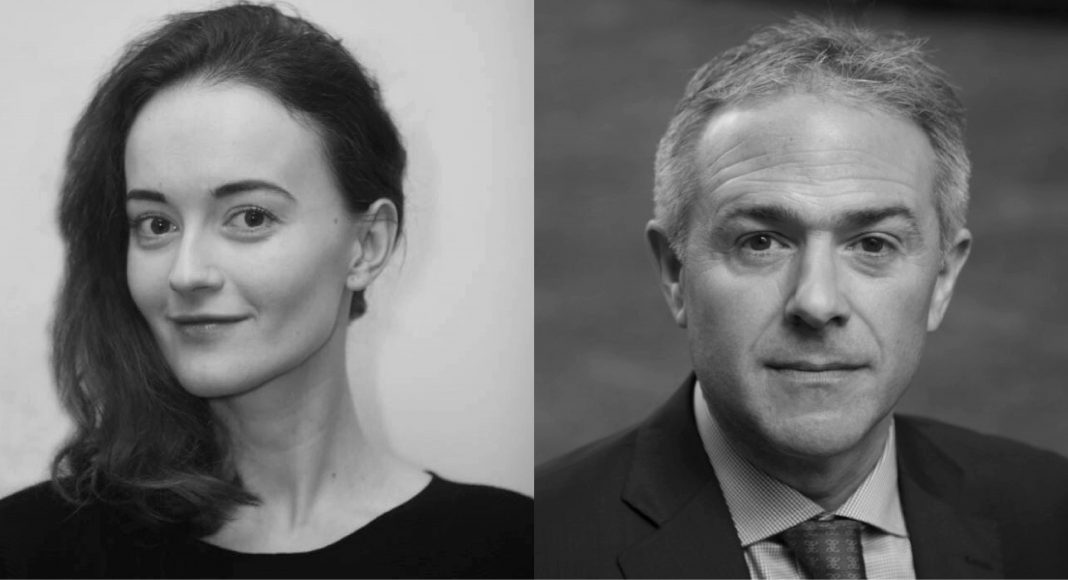The editor-in-chief of the Kyiv Independent speaks with FT journalist Edward Luce in an exclusive video interview covering the challenges of her position, the role of the West, the metamorphosis of Volodymyr Zelensky, and the Russian military.
Last fall, Olga Rudenko was a journalist in residence at the Stigler Center. Now she is the editor-in-chief of the Kyiv Independent, which she helped launch just three months ago. In a Stigler Center recording, Edward Luce, the Financial Times‘ US national editor, chief commentator and columnist, asked Olga about the challenges of her position, the role of the West, the metamorphosis of Volodymyr Zelensky and the Russian military.
Kyiv Independent
Before the war, the Kyiv Independent had about 30,000 Twitter followers. Now, it has 1.7 million.
“We have been quite successful in establishing ourselves as the go-to local source of news about Ukraine in English. It’s great but it’s a big responsibility,” said Rudenko.
Support has come not only in the form of Twitter followers and website traffic, but in fundraising for the fledgling organization.
Prior to the Russian invasion, Rudenko says the publication had made contingency plans, but she says she was 80 percent certain they wouldn’t be necessary. Once Russia attacked Ukraine, the team at the Kyiv Independent was focused on getting their families to safety.
“It is survival mode for the country and for us too,” she said.
Now, the staff at her publication are settled temporarily in safer parts of the country, with the exception of a few who are still reporting from Kyiv, and their focus is solely on covering the war.
“There is a tremendous sense of duty in covering this,” Rudenko said, “we now have more capacity to show, among other things, the human tragedy of the war.”
Rudenko left Kyiv because she was worried about being cut off from the internet. “The biggest thing that I feared was that they will try to cut off mobile networks and internet connections,” she said.
Rudenko also said she knows that the Kyiv Independent is now a high profile target for cyber attacks. There have been issues with the website, but that the developers weren’t sure if it was due to high traffic or a cyber attack.
When asked about the option of setting up an operation in Warsaw or another city outside of Ukraine, Rudenko says it would be the choice of last resort.
“Leaving Ukraine is the last thing I would want to do. For as long as possible we need to stay here, even if it’s in Western Ukraine.”
President Zelensky
Prior to the war, Olga wrote an opinion article for the New York Times that was critical of Ukrainian president Volodymyr Zelensky.
“My op-ed was an honest analysis of him before the war,” she said. “I was, as everybody was, stunned by the metamorphosis of Zelensky.”
Now the entire country is united behind the great performance that president Zelensky is putting out: that of an ordinary guy speaking the hard truth, and bravely standing up to Russian attempts on his life.
“If the Russians wanted to kill him in the beginning, they probably want to kill him more now,” Rudenko said. But she thinks that the Russians don’t fully understand that killing him will not result in Ukrainians putting down arms.
It’s only partly true that Zelensky’s courage is inspiring Ukrainians, she said, it’s more that Ukrainians’ courage is inspiring Zelensky.
Russian Military
Rudenko was as surprised as everyone to see the disorganization of the Russian military in Ukraine, but she tries to keep a sober lens. What’s important, she says, is that the Russian soldiers have no motivation or personal reason to be in Ukraine, while Ukrainian soldiers have every reason to fight back.
“It’s their land, it’s their country, and it’s clear who the enemy is,” she said, and that appears to be making all the difference.
The West
When asked about the reluctance to declare a no-fly zone over Ukraine, Rudenko says she understands the concern that it may be interpreted as a direct act of war to Russian president Vladimir Putin, but she disagrees with the line of thinking that his interpretation should dictate the response.
“It’s just postponing the problem,” she said. Western leaders are “going to have to deal with it eventually, whether it’s today, tomorrow, or in 15 years.”






